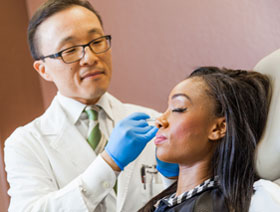 Sleep is not only crucial for our overall well-being but also plays a significant role in maintaining healthy skin. The relationship between sleep and skin health has been extensively studied, revealing compelling evidence of how a good night’s sleep or the lack thereof can affect the quality and appearance of our skin.
Sleep is not only crucial for our overall well-being but also plays a significant role in maintaining healthy skin. The relationship between sleep and skin health has been extensively studied, revealing compelling evidence of how a good night’s sleep or the lack thereof can affect the quality and appearance of our skin.
The Role of Sleep in Skin Repair
Research published in the journal Clinical and Experimental Dermatology revealed that individuals who slept for seven to nine hours exhibited better skin moisturization and improved ability to protect and repair themselves from ultraviolet light damage, compared to those who slept for five hours or less.
During sleep, our bodies undergo vital restorative processes, and our skin is no exception. Sleep plays a crucial role in facilitating skin repair and regeneration. It is during this time that our body produces higher levels of collagen, a protein responsible for maintaining the skin’s elasticity and youthful appearance. Collagen production helps repair damaged skin cells, promote a healthy skin barrier, and minimize the appearance of fine lines and wrinkles. Inadequate sleep disrupts this repair process, leading to a breakdown in collagen production and compromising the skin’s ability to recover from daily damage, such as sun exposure and environmental pollutants.
Impact of Sleep Deprivation on Skin
One of the most noticeable effects of lack of sleep on the skin is the emergence of dark circles under the eyes. Sleep deprivation causes blood vessels to dilate, resulting in a pooling of blood and fluid accumulation in the delicate skin around the eyes. Additionally, insufficient sleep can exacerbate skin conditions such as acne, psoriasis, and eczema. The skin’s natural barrier function becomes compromised, leading to increased sensitivity, inflammation, and a higher likelihood of flare-ups. Studies have also shown that poor sleep quality is associated with increased signs of skin aging, including uneven skin tone, dullness, and reduced skin elasticity.
Sleep, Stress, and Skin Health
Sleep and stress share a bidirectional relationship, with each influencing the other. Lack of sleep can significantly contribute to increased stress levels, while stress, in turn, disrupts sleep patterns. Chronic stress triggers the release of cortisol, a stress hormone that can impair collagen production, accelerate the aging process, and contribute to skin conditions such as acne and rosacea. Moreover, stress-induced inflammatory responses can further compromise the skin’s integrity, leading to increased redness, sensitivity, and skin barrier dysfunction. Prioritizing quality sleep and adopting stress management techniques such as meditation and relaxation exercises can help maintain a healthy balance and promote optimal skin health.
Tips for Enhancing Sleep Quality
Improving sleep quality can positively impact your skin’s health and appearance. Here are some practical tips to help you achieve a restful night’s sleep:
- Establish a consistent sleep schedule and stick to it, even on weekends.
- Create a soothing bedtime routine to signal your body that it’s time to wind down.
- Create a sleep-friendly environment by keeping your bedroom cool, dark, and quiet.
- Limit exposure to electronic devices before bedtime, as the blue light emitted can disrupt sleep patterns.
- Avoid heavy meals, caffeine, and stimulating activities close to bedtime.
- Incorporate relaxation techniques such as deep breathing exercises or meditation into your evening routine.
- Invest in a comfortable mattress, pillows, and bedding to optimize your sleep comfort.
- Use retinol products at night. Retinol stimulates cell turnover and promotes the production of new skin cells, allowing it to work synergistically with the skin’s natural renewal mechanisms.
Achieving quality sleep is not only vital for our overall well-being but also plays a pivotal role in maintaining healthy, glowing skin. By understanding the intricate connection between sleep and skin health, you can make informed lifestyle choices that prioritize adequate sleep and healthy, beautiful skin.


